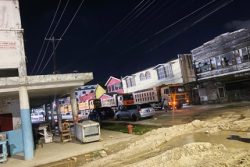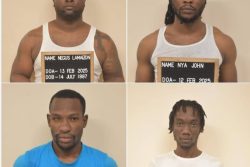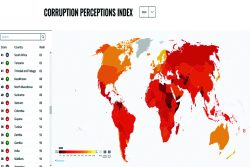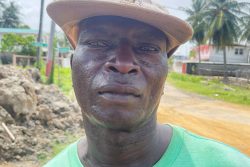The government feels that certain media houses are posing a threat to the holding of peaceful elections and intends to alert the United Nations on the matter, Presidential Advisor on Governance Gail Teixeira said last evening.
While not naming media houses, Teixeira also indicated that the administration will be calling for an independent investigation into the matter. Her statements were in response to a press release issued on Monday by the Guyana Press Association (GPA) condemning the attacks on the media by both President Bharrat Jagdeo and Teixeira during the PPP/C’s Sunday rally in Kitty.
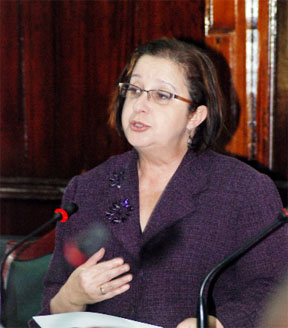
In a statement released last evening, Teixeira accused the GPA of conveniently “plucking out sections” of the two speeches so as to peddle misinformation. According to her, both she and the President alluded to the Rwandan experience in order to remind the audience about the “inciteful role of certain Guyanese media houses in past elections”. The statements were also to point to the threat of ethnic and religious disunity and violence due to the recent suspension of CNS Channel 6 and the “untruthful reporting” on the matter by some media houses.
The GPA, in its statement, noted that President Jagdeo pointed out media operatives at the rally and described them as “vultures and carrion crows” who should be “thrown into jail” for going after him and his government. Jagdeo’s assertion that local media should be placed before an international court and jailed was wholly uncalled for, damaging and repugnant, the release said. Teixeira’s provocative attempt to compare Rwanda’s media and its role in that country’s genocide to the Guyana media, the GPA declared, was also highly inflammatory and should be condemned as an attempt to both silence and bring harm to the local media. At Sunday’s meeting, Jagdeo singled out Stabroek News, Kaieteur News, CNS Channel Six and Demerara Waves.
Countering, Teixeira said that “it is an indisputable fact that some media operatives and stations in Guyana called for ethnic violence in the 1997 and 2001 elections resulting in the Bi-partisan Committee which crafted the broadcasting policy that is now enshrined word for word in the new Broadcasting Act 2011”. She said that media operatives such as Enrico Woolford and Moses Nagamootoo actively participated in the wording of that policy to ensure that the experience of those elections would never be repeated.
“Guyana is a democratic nation,” she said, adding that “freedom of the press and freedom of expression are upheld in the constitution and in practice but these are not absolute rights”. “The rights of journalists are respected but these rights do not place them above the constitution and the laws of the country; they are held accountable to those same statutes as all citizens,” she said.
Teixeira criticized the GPA for not condemning recent statements at two meetings by an ACDA official stoking racial insecurities and threatening violence after the elections. She did not elaborate. She also accused the GPA of failing to rein in its own media operatives, saying that some feel that they “are impervious to criticism or correction.
“Whilst it is true that no media is running in elections it would not be considered passing strange for observers to conclude that some nakedly assume the role of the Opposition parties in these elections, she said.
The Government of Guyana, Teixeira emphasized, will not stand idly by and allow anyone to fan the flames of ethnic and religious disunity in Guyana and called on all media houses and their operatives “to act professionally, report accurately and provide the public with balanced information in keeping with the 2011 Media Code of Conduct, the Guyana Consti-tution and the laws of Guyana”.
“The Fourth estate is the media and it shoulders the responsibility to ensure that the people are given information that is balanced and that there is fair comment,” Teixeira said. “Some media houses in Guyana do abide with these principles and others willfully feel they are above reproach. Rwanda opened the eyes of the world that the media was not sacrosanct and it too had to be held accountable as it did not have a license to be irresponsible and reckless with peoples’ lives,” she declared.
In a comment on Teixeira’s statement, Stabroek News Editor-in-Chief Anand Persaud said the reference by the President and Teixeira to Rwanda at Sunday’s meeting was uncalled for and amounted to scaremongering. He noted that the 2006 election campaign had been largely free of inflammatory reportage and thus far there has been little to be concerned about. Invoking the Rwanda example, he said, created a false impression that there had recently been such reportage.
Persaud said it was amusing that the government would seek recourse to the UN on a whim when it has steadfastly refused to permit external scrutiny of the rampage of death squads here and the allegation of the involvement of government officials in their operation. This government rebuff, he noted, was delivered at the UN Human Rights Council’s Universal Period Review of Guyana’s human rights situation last year in Geneva. Persaud said that Teixeira’s threat was another thinly veiled attempt at media intimidation. He said any recourse to the UN would likely lead to uncomfortable questions for the government on its repression of sections of the media and its lockdown of the broadcast sector over the last 19 years.


